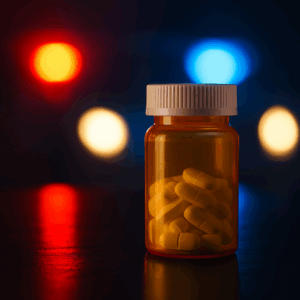Understanding How South Carolina Defines DUI 
South Carolina law makes it illegal to drive while under the influence of alcohol, drugs, or a combination of both if those substances impair a person’s faculties to the extent that they are unsafe behind the wheel. The statute does not make a distinction between illegal narcotics and prescription drugs obtained from a pharmacy. The central question is whether the driver was impaired. A legal prescription provides permission to use the medication but it does not provide a defense against a DUI if the drug interferes with safe driving.
Prescription Drugs That Often Lead to DUI Arrests
Different types of prescription drugs can impair drivers in different ways. Painkillers such as opioids may cause drowsiness, confusion, or slowed reflexes. Anxiety medications and muscle relaxants may affect balance, coordination, and reaction time. Sleep aids are particularly risky if taken late at night since their effects can continue into the next day. Even medications prescribed for attention disorders, when misused or taken in higher doses than prescribed, can lead to erratic or unsafe driving. These medications can affect drivers in ways that officers notice quickly. A driver may weave within a lane, fail to stop promptly, or appear unusually confused during a traffic stop. Law enforcement officers rely on field sobriety tests, observations of physical condition, and chemical tests to determine whether a driver may be impaired by a prescription drug.How a Prescription Drug DUI Case Differs from Alcohol Cases
Alcohol cases are often straightforward because a breath test can measure blood alcohol concentration and the law provides a clear limit. With prescription drugs, there is no set threshold that defines impairment. A blood or urine test may show that medication is in the system, but the presence of the drug is not enough to prove guilt. The prosecution must still show that the medication impaired driving ability. This often makes prescription drug DUI cases more complex and more dependent on officer testimony and expert analysis.Consequences of a Prescription Drug DUI in South Carolina
The penalties for a DUI based on prescription drugs are the same as those for an alcohol related DUI. A conviction may lead to fines, suspension of a driver’s license, mandatory substance abuse treatment, and even jail time. The severity of the punishment depends on whether this is a first offense or a repeat offense and whether there are aggravating factors such as a collision or injury. Beyond the court ordered penalties, a conviction can affect employment opportunities, increase insurance costs, and create a permanent criminal record.Building a Defense Against Prescription Drug DUI Charges
Because prescription drug DUI cases often rest on subjective evidence, a strong defense can make a major difference. A defense attorney may challenge the claim that the medication actually impaired the driver. Side effects vary from person to person and medical testimony may show that the prescribed dose should not have caused impairment. The defense may also examine whether the officer conducted the stop and field sobriety tests correctly. In some cases, medical conditions unrelated to prescription drugs may explain behavior that appeared unusual to law enforcement.Why Legal Help is Critical
Defending a prescription drug DUI requires more than understanding the law. It requires analyzing medical records, test results, and police reports. Expert witnesses may be needed to explain how a particular drug affects the body and whether the observed behavior can truly be linked to impairment. The Bateman Law Firm has experience handling DUI cases throughout Greenville, Spartanburg, Clemson, and surrounding areas. Our team understands the stress that comes with these charges and we know how to protect your rights and build the strongest possible defense.Frequently Asked Questions About Prescription Drug DUIs
One common question is whether having a valid prescription is a defense. The answer is no. A prescription allows you to take the medication but does not excuse unsafe driving if the drug causes impairment. Another question is whether officers can tell the difference between drug impairment and a medical condition. Officers may not always know the full story at the roadside. That is why it is important to work with a lawyer who can explain your medical situation and challenge assumptions made during the arrest. A third question is whether refusing a chemical test is a good idea. In South Carolina, refusal can lead to an automatic suspension of your driver’s license under the state’s implied consent law. That is why you should understand your rights before deciding how to respond to law enforcement requests.Related Videos
Refusing Field Sobriety Tests
Choosing a DUI Attorney













